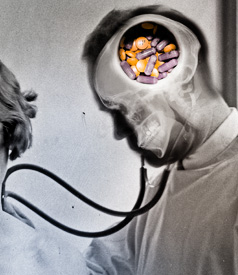Truthout is an indispensable resource for activists, movement leaders and workers everywhere. Please make this work possible with a quick donation.
The pharmaceutical industry has wormed its way into the hearts and minds of the medical professions in any number of ways—wining and dining doctors, sending them off to vacation in splendid spas, and even buying their names to put on industry-written articles promoting different drugs.
One little known facet of this drugster-doctor relationship is Big Pharma’s role in continuing medical education (CME) programs, which are important in keeping medical professionals informed and up to date on the fast developing profession. Of the $2 billion-odd spent on these programs every year, nearly half comes from the drug business, which not-so-subtly uses the education programs to push new drugs.
Last week a conference at Georgetown University called “Prescription for Conflict” pulled together experts from academia, government, and industry to discuss the question: Should industry fund continuing medical education? The main instigator here is a former colleague of mine named Adriane Fugh- Berman, a doctor and teacher at Georgetown University Medical School. Fugh-Berman long ago became the nemesis of Big Pharma with a stream of articles and talks questioning the different aspects of liaison between the drugsters and the medical profession. I worked with her helping to set up PharmedOut.org, a website that seeks to educate the public on these liaisons, in part through exposes, both written and on video.
The conference at Georgetown included few critics as candid as Fugh-Berman. Those gathered included polite academics with hedged criticism of industry funding, and regulators like Joshua Sharfstein, principal deputy commissioner at the FDA, and Julie Taitsman, chief medical officer the Department of Health and Human Services, who presented a list of the different laws protecting the public. By the time they finished, I was so frustrated with government bureaucrats that I was about ready to join the Tea Party (except that they, of course, would want to do even less to control the greedmeisters at Big Pharma).
One blunt critique came from Paul Thacker, an investigator for Senate Republican Charles Grassley, who has been the most visible Congressional muckraker on the doctor-drug company love-in. Thacker bluntly told the docs to get off their supercilious “who me?’’ attitude and come to grips with the scarcely believable conflicts of interest existing between the medical profession and the drug industry–conflicts that more often than not have been to the detriment of their patients.
The industry, as always, insists it isn’t doing anything bad–far from it. Big Pharma, its representatives would have you believe, is really performing a public service, trying to educate docs so they can do a better job. This conference, however, offered a different point of view, in the statement of an anonymous “pharmaceutical executive,’’ who admitted industry involvement in “CME has the potential for inappropriate promotional messaging and influence.’’
The anonymous exec went on to state: “Typically,companies make CME investment decisions at annual budget meetings. The Sales and Marketing divisions dominate deliberations.and distribution of CME cash.’’ In deciding what institutions are to get money, he continued, “large volume, influential institutions are not likely to be rejected…Friendly institutions, as defined by access and volume, are more likely to receive grants than those that favor another company’s products. Grants may also be made in support of programs including particular KOLs [key opiniong leaders] whose opinions resonate with the promotional plan…Similarly, those known for positions antithetical to the company’s promotional plan are less likely to be supported.’’
In conclusion, the exec said, “CME contributions are commercial decisions,’’ and, finally, “CME is not compatible with commercial intervention.’’ Too bad it takes a drug company whistleblower to make this statement of the obvious, rather than the medical organizations and government regulatory agencies who are supposed to be looking out for us.
Unsilent Generation is a site for people who don’t believe that getting old means getting dumb, getting conservative, getting complacent, or getting used to spending your days driving a golf cart to early bird dinner specials. Founded in 2008 in response to a gap in both the mainstream and alternative media, Unsilent Generation features information and commentary on a variety of timely issues and subjects, from a no-nonsense, progressive point of view. Most importantly, Unsilent Generation is not meant for any particular generation: It’s for everyone who is old or plans on some day becoming old.
A terrifying moment. We appeal for your support.
In the last weeks, we have witnessed an authoritarian assault on communities in Minnesota and across the nation.
The need for truthful, grassroots reporting is urgent at this cataclysmic historical moment. Yet, Trump-aligned billionaires and other allies have taken over many legacy media outlets — the culmination of a decades-long campaign to place control of the narrative into the hands of the political right.
We refuse to let Trump’s blatant propaganda machine go unchecked. Untethered to corporate ownership or advertisers, Truthout remains fearless in our reporting and our determination to use journalism as a tool for justice.
But we need your help just to fund our basic expenses. Over 80 percent of Truthout’s funding comes from small individual donations from our community of readers, and over a third of our total budget is supported by recurring monthly donors.
Truthout’s fundraiser ends tonight! We have a goal to add 143 new monthly donors before midnight. Whether you can make a small monthly donation or a larger one-time gift, Truthout only works with your support.
